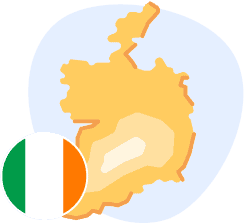Despite its small geographic size, Ireland’s education system is highly regarded, and is increasingly a destination of interest for international students. Irish children begin their studies at age 4 in the primary education system, and shift to post-primary education between ages 12 and 18. Schooling is mandatory for all children between the ages of six and sixteen, but after graduating from post-primary, some students pursue third-level education.
Local Lingo: In Ireland, post-secondary education is called “third-level education.” It includes undergraduate and postgraduate studies.
Ireland has thirteen universities and technological universities, and many other higher education institutions. Qualifications from these institutions are respected, and graduates enjoy a relatively stable, high employability rate. International students who study in Ireland gain skills to support their career development and enhance their lives after graduation.
Read on to learn more about:
- Third-level education options
- Degree types and course designations
- Pathway programs that can help you prepare for your course of choice
Did you know students studying at Irish universities are rated some of the happiest? Here are even more reasons you should study in Ireland!

Irish Higher Education Levels
The National Framework of Qualifications (NFQ) is a scale that defines which academic qualifications students receive at each level of study. The NFQ uses 10 levels to describe the Irish education system, and outlines the skills and knowledge a student needs to receive a qualification at each level.
Considering studying abroad in Ireland and wondering how your credentials line up? The National Academic Recognition Information Centre (NARIC)’s online Ireland Foreign Qualifications tool can help you understand where you fit on the NFQ scale.
If you plan to study in Ireland, then work in the European Union after graduation, we’ve got good news for you! Ireland’s NFQ is compatible with the European Qualifications Framework. This allows graduates from Irish institutions to pursue work or study in other EU countries.
Third-level education in Ireland includes NFQ levels 6–10. Let’s look at those levels below:
Level 6
Advanced Certificate:
- One-year course at a state-funded college.
- Builds career-specific skills in students who want to enter the workforce after graduation.
- Usually awarded by Quality and Qualifications Ireland (QQI).
Higher Certificate:
- Usually a two-year course at an Institute of Technology.
- Prerequisite qualification: Leaving Certificate or equivalent.
- Higher Certificate holders may pursue an ordinary bachelor’s degree with an additional year of full-time study.
Level 7:
Ordinary Bachelor’s Degree:
- Three-year course at institutes of technology, technological universities, or universities.
- Prerequisite qualification: Leaving Certificate or equivalent.
- Higher Certificate holders can pursue an ordinary bachelor’s degree through transfer programs, which are typically one year long.
Level 8:
Higher Diploma:
- One-year course at institutes of technology, technological universities, or universities.
- Prerequisite qualifications: usually, an honours bachelor’s degree. Ordinary bachelor’s degree holders may also enroll.
- Many students pursue higher diplomas after a bachelor’s degree, choosing a new subject so they can qualify for pursuing a master’s degree in that subject.
Honours Bachelor’s Degree:
- Three- to four-year course. However, majors like architecture, dentistry, and medicine will take longer.
- Awarded by institutes of technology, technological universities, and universities.
- Prerequisite qualification: Leaving Certificate or equivalent.
- Ordinary bachelor’s degree holders can progress to an honours bachelor’s degree via one-year transfer programs.
Level 9:
Master’s Degree:
- Taught master’s degrees take one to two years, and are coursework-based.
- Research master’s degrees take two years, and allow students to focus on one area of study. As part of this course, students produce a large research project.
- Master’s degrees are awarded by institutes of technology, technological universities, and universities.
- Prerequisite qualification: honours bachelor’s degree.
Postgraduate Diploma:
- One-year course at institutes of technology, technological universities, and universities.
- This diploma is coursework-based and doesn’t require a dissertation to graduate.
- Prerequisite qualification: honours bachelor’s degree.
Level 10:
Doctoral Degree:
- Takes three to four years to complete at technological universities and universities.
- Prerequisite qualification: honours bachelor’s degree or master’s degree.
- If an honours bachelor’s degree holder enrolls in a doctoral degree program, they’ll register for a research master’s degree or provisional doctoral candidature. The student then becomes a full doctoral candidate on a PhD-track program.
- Students can pursue professional doctoral degrees or practice-based doctoral degrees.
Higher Doctorate/Honorary Degree:
- Awarded to students who’ve made a significant contribution to research in their field.
- Prerequisite qualification: doctoral degree or equivalent.
- Never awarded based on program completion.
Irish Universities
Irish universities are located in historic communities and contribute to the country’s tourism, sports, arts, and entertainment sectors.
Ireland’s thirteen universities and technological universities are:
- Atlantic Technological University
- Dublin City University
- Maynooth University
- Munster Technological University
- Royal College of Surgeons in Ireland
- South East Technological University
- Technological University Dublin
- Technological University of the Shannon
- Trinity College Dublin
- University College Cork
- University College Dublin
- University of Galway
- University of Limerick
Each university offers courses that lead to bachelor’s, master’s, and doctoral degrees, as well as higher and postgraduate diplomas. Many programs also include the opportunity to work in your field during your third or fourth year of study.

Irish Technological Universities and Institutes of Technology
These institutions’ graduates build high-demand skills designed for the workplace. The development of technological universities is a part of Ireland’s education strategy, so their numbers are growing!
Undergraduate and postgraduate certificates, degrees, and diplomas are available. These institutions partner with industry leaders to provide new educational experiences and industry-relevant research. Programs are offered in business, science, education, linguistics, music, health, agriculture, and journalism. Many of these programs also include work placements.

Irish Colleges
The Irish third-level education system also includes colleges of education and other colleges, including state-funded ones.
Colleges of Education provide training for future Irish primary school teachers. Courses include three-year Bachelor of Education degrees and 18-month postgraduate diplomas. Most students complete both programs.
Other colleges focus on work training for students who plan to enter the workforce directly. Many are linked to HEIs. Most state-funded colleges grant degrees validated by Quality and Qualifications Ireland. Some private college qualifications are validated by foreign universities, and some don’t use external validation.

Pathway Programs
Pathway programs support students who need to improve their academic or language skills before starting their desired program. Both HEIs and private companies offer pathway programs.
English Language Education Programs
If you want to build your English-language skills before taking exams like IELTS and TOEFL, consider one of these programs. Many also provide access to homestays and extracurricular activities. Considering your options? The Accreditation and Co-ordination of English Language Services (ACELS) publishes an annual list of quality-assured English Language Education schools.
Academic Pathway Programs
These programs help students meet academic requirements for their course. Some provide intro courses in the students’ fields of study, English for Academic Purposes, and Irish culture. These “foundation programs” also connect you with international student support services.
Now, you know how the Irish education system is structured, different qualifications and institutions, and how pathway programs can support your study abroad goals.
Want to learn more? Our experts can help guide you—for free—from application to arrival.



